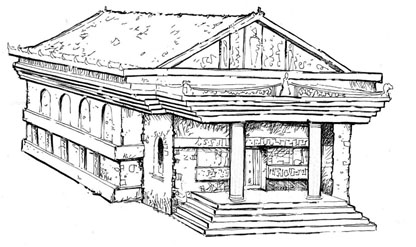
SESSION 20B: TEE AND THE SILVER FATAR
April 27th, 2008
The 8th Day of Kadal in the 790th Year of the Seyrunian Dynasty
When they had a moment alone, Dominic asked Tee if she would go on his behalf to see Rehobath, the Silver Fatar of Athor. The note they had found at the Foundry regarding the “Chosen of Vehthyl” had left him deeply concerned about the meeting he had scheduled the next day at the Temple of the Clockwork God. Were they setting him up for something? Were they planning to do something to him?
Dominic felt that he was in desperate need of guidance. But he also didn’t want to walk into the lion’s mouth if it turned out that the Imperial Church was as interested in him as the Reformists.
Tee was more than willing to help. After leaving Dominic at the Ghostly Minstrel, she headed to the Outer Cathedral of Athor.

Athor’s Cross
The cathedral was ancient, its presence in Ptolus a testament to one of the three Merchant Princes who had gone to the Novarch in Seyrun and begun the Great Conversion. It was designed around Athor’s traditional cross and layered with intricate iconography and complex ornamentation. Graven images of saints and figures of pantheistic significance covered almost every surface, including the ornately carved pews in the sanctuary. Holy knights of the Order of the Dawn could be seen guarding every entrance.

Order of the Dawn
Tee had suspected it would be more than a little difficult to get an audience with Rehobath, but she had – if anything – underestimated how impossible it truly was. She was shuffled constantly from one priest to another without ever seeming to get any closer to the fatar, but just as she was about to give up a prelate who happened to be passing by stopped in his tracks.
“Excuse me, would you be Tithenmamiwen?” he asked.
Tee nodded.
“I couldn’t help overhearing that you wished to see the Silver Fatar. He had mentioned meeting you at Castle Shard. If you wouldn’t mind waiting, I’m sure we can find you a few minutes to speak with him.”
The prelate shooed the other priest away and led Tee to a luxuriously furnished waiting room – a place of crimson satins and velvet cushions. Tee was still left waiting for more than an hour, but eventually a priest came in and escorted her to Rehobath’s personal office.
The office was at the apex of the cathedral’s tower. A huge, vaulted ceiling left Tee feeling particularly small as she was led down the long length of the hall. A fire burned in a mantle of marble to her left; to her right statues of Athor in each of his aspects flanked the wall to the right. At the far end of the chamber curtains of crimson silk hung before tall windows looking south across the Temple District and across the lower length of the city.
In front of the windows, Rehobath sat behind an enormous desk of godwood – the pale, almost pearlescent wood glowing faintly with a white light in the presence of divine magic.
Rehobath rose at Tee’s approach and smiled broadly. Tee bowed slightly and then sat down.
“Mistress Tithenmamiwen,” Rehobath said. “It’s a pleasure to see you again. Prelate Adlam tells me that you had some matter to discuss with me.”
“Yes,” Tee said. “I have a friend who I think might be in trouble. I recently… umm… found a note that I think is talking about him. I think its very disturbing.”
Tee produced the note and gave it to Rehobath. As he read the note, the look of concern – which seemed like more of a polite façade than anything else – was replaced by one of genuine shock.
“Maeda thinks she’s found the Chosen of Vehthyl?”
“I guess so,” Tee said. “I’m sorry… but what does that mean, exactly?”
“Yes, of course. Let me explain.” Rehobath settled back into his chair. “The Chosen are living saints. The gods themselves have chosen them as direct conduits of their will within the mortal world.”
“You mean the Chosen can talk to the gods?”
“In a way. It would be more accurate to say that they are the living will of the gods made manifest.” Rehobath’s eyes danced over the note again. “Is it true that your friend has the Mark of Vehthyl?”
“I don’t even know what the mark would look like.”
“There are many possible marks, but the Mark of Vehthyl is most often described as eyes which glow with a silver light.”
Tee shifted nervously. “Yes. I’ve seen that.”
Rehobath could barely contain his excitement. “Then your friend has been honored. Would it be possible for me to speak with him?”
“Possibly,” Tee said. “The letter has frightened him. But I’ll talk to him about coming to you.”
“Thank you.” Rehobath paused for a moment and then looked at her significantly. “Your friend Dominic is an itinerant priest, isn’t he?”
Tee quickly denied that Dominic was the friend she had been talking about… and then realized that she’d probably just confirmed Rehobath’s suspicions. Flustered and angry with herself, she made her excuses and farewells.
Rehobath rose and walked her to the door himself, asking her once again – on the way – to have her friend come and talk to him as soon as possible.



 The creature was, of course, a troll. And you eventually figured out that the only way to permanently injure it (and eventually kill it) was by dealing damage with fire. Think about how exciting it was to figure that out!
The creature was, of course, a troll. And you eventually figured out that the only way to permanently injure it (and eventually kill it) was by dealing damage with fire. Think about how exciting it was to figure that out!









